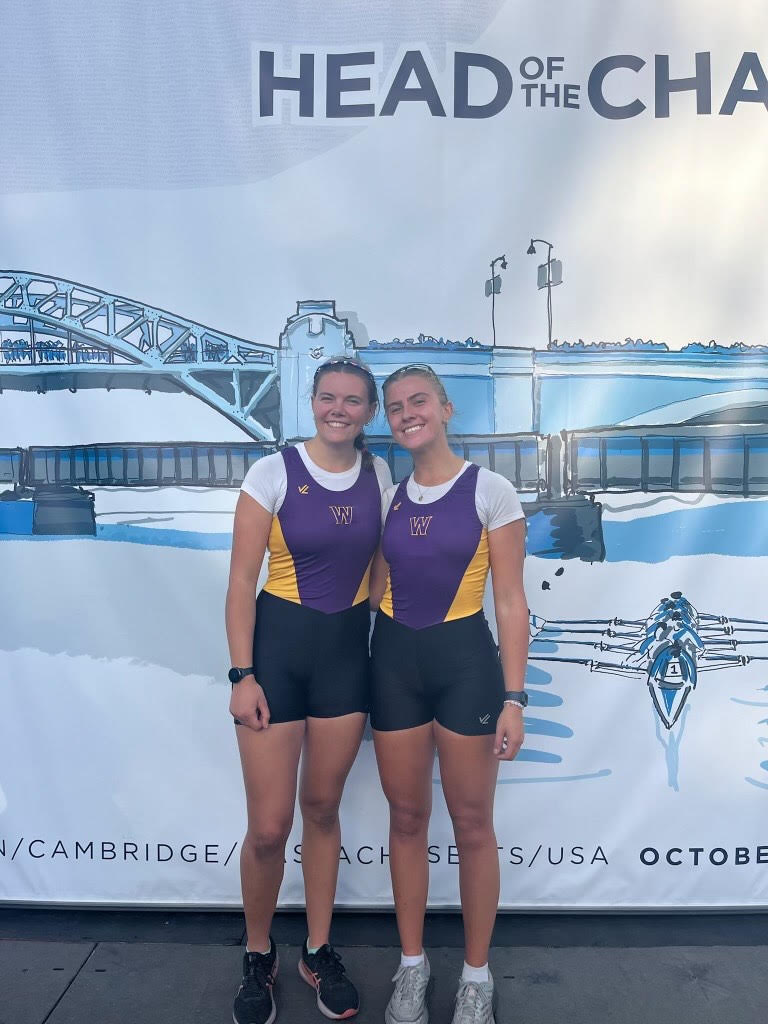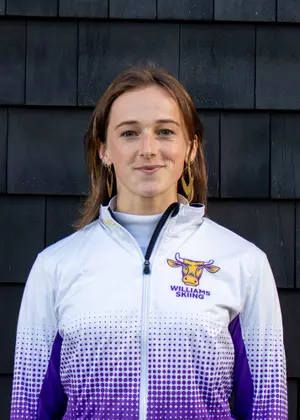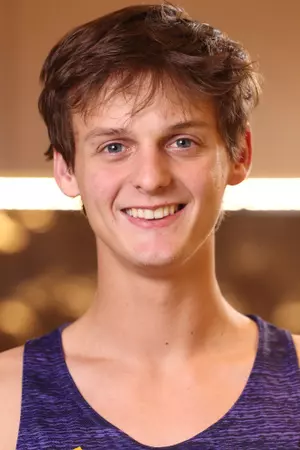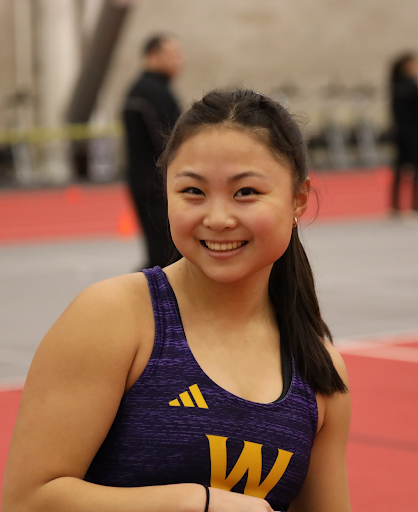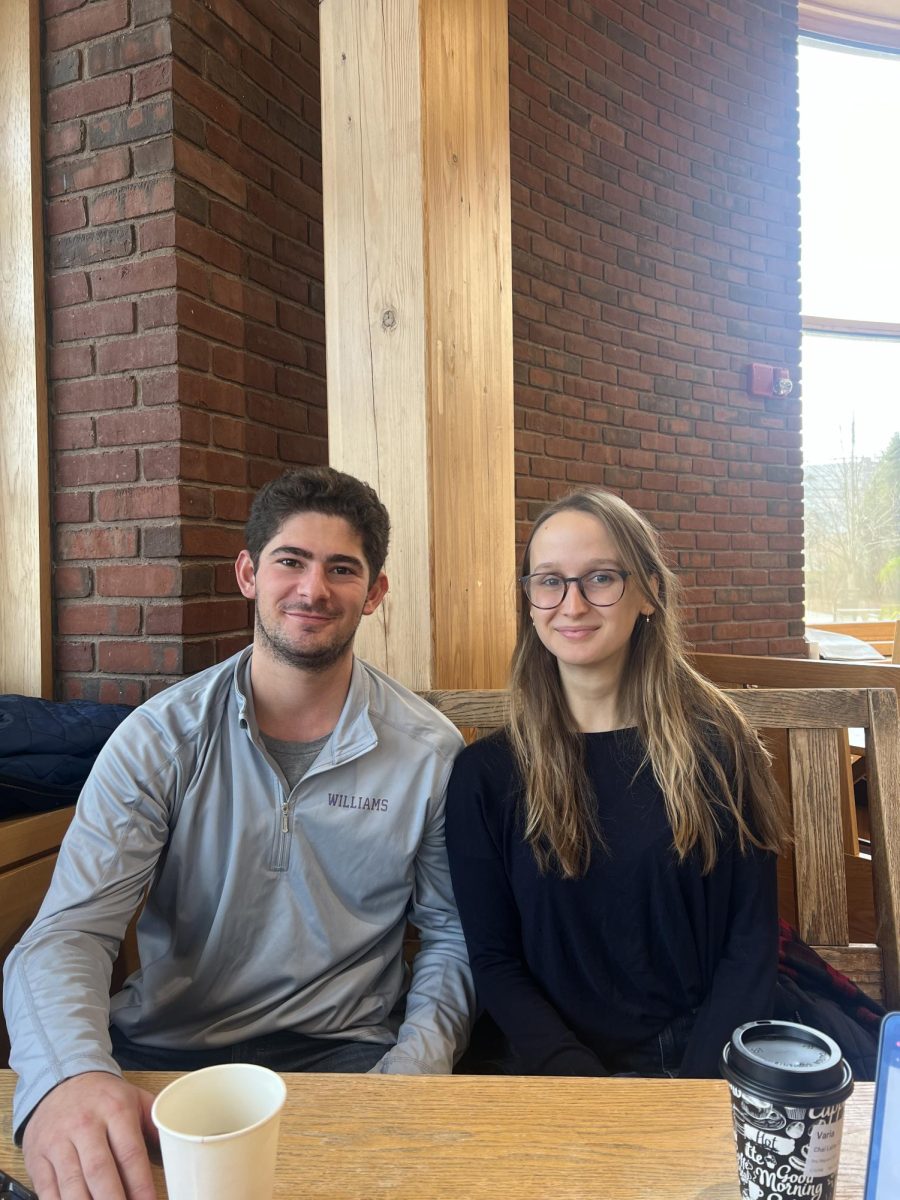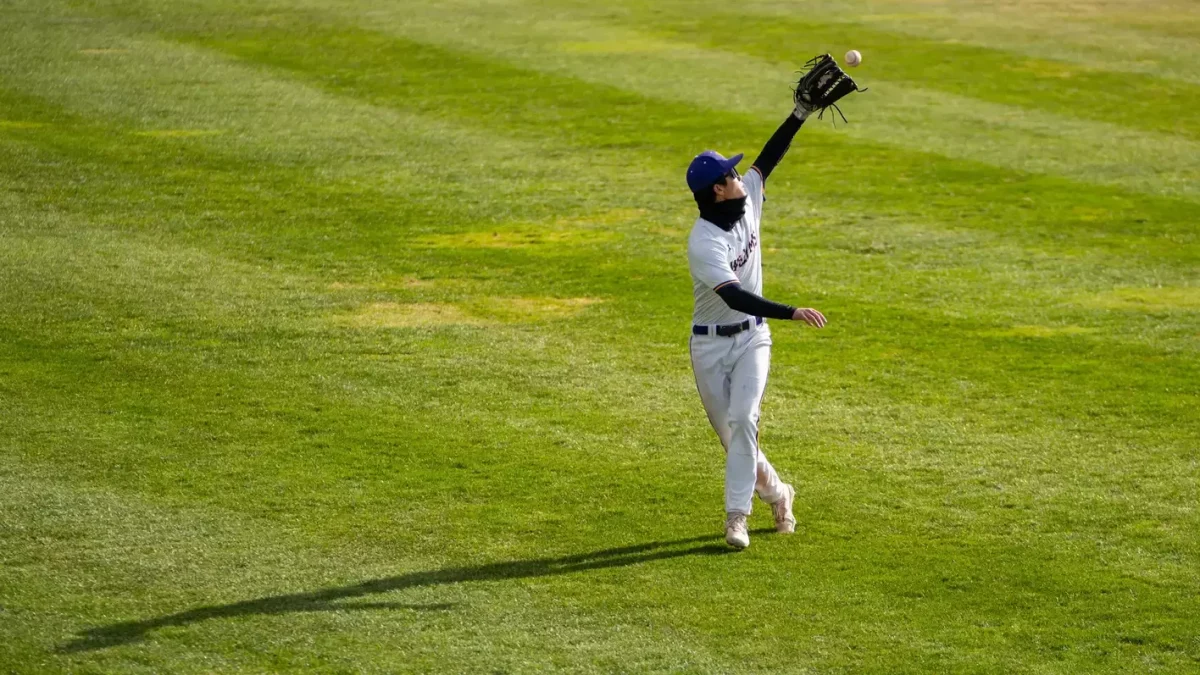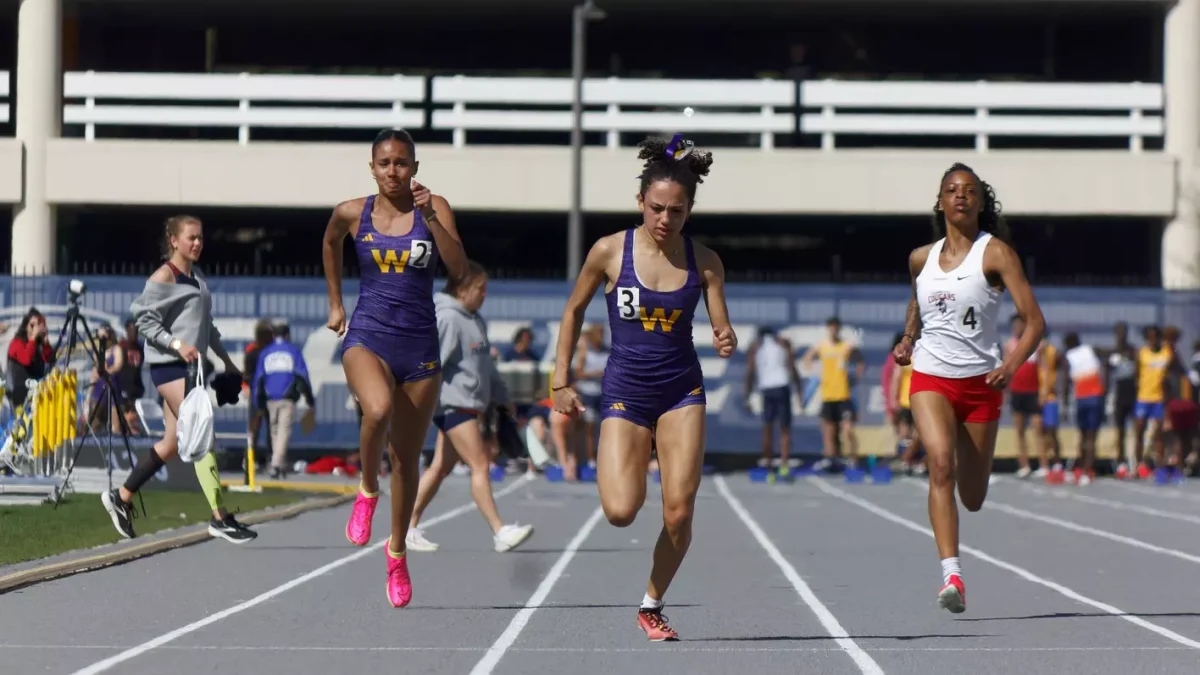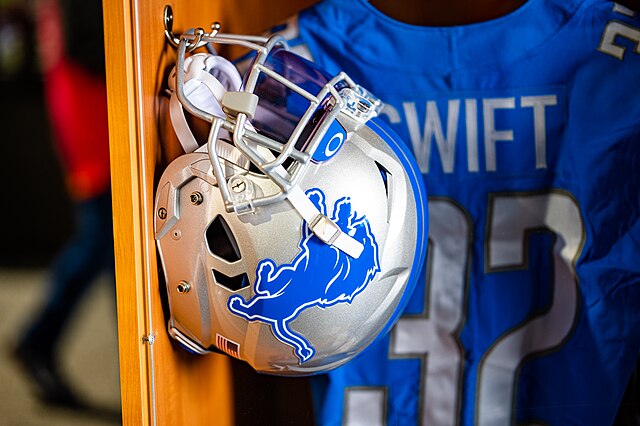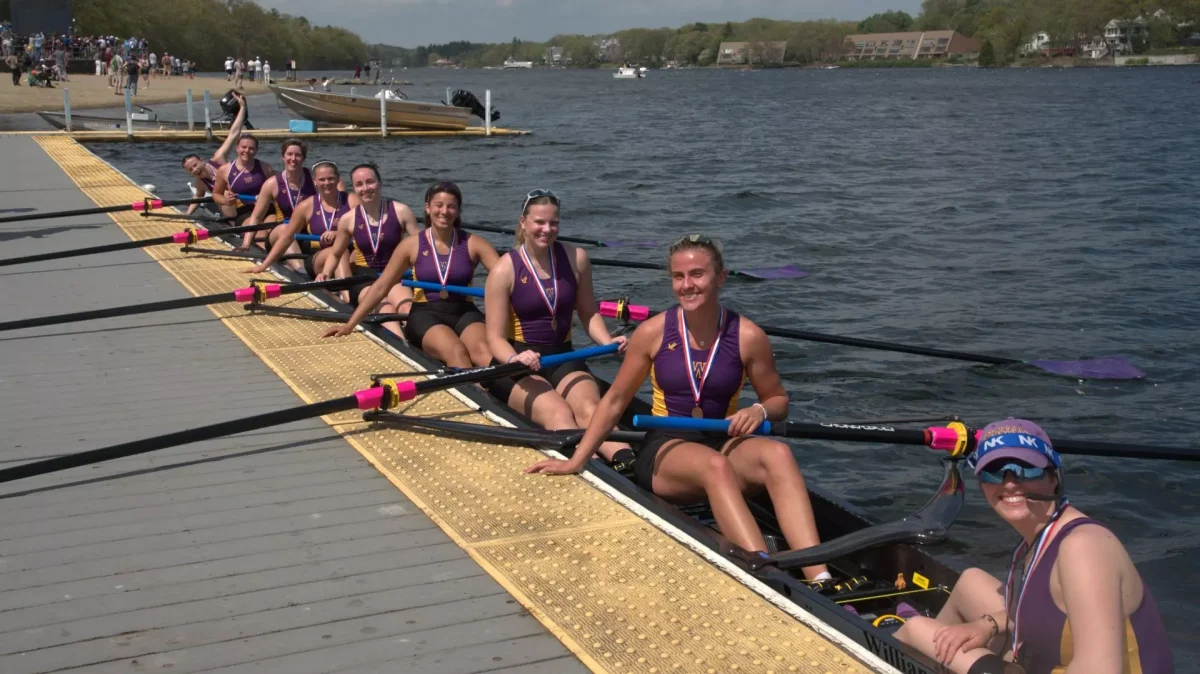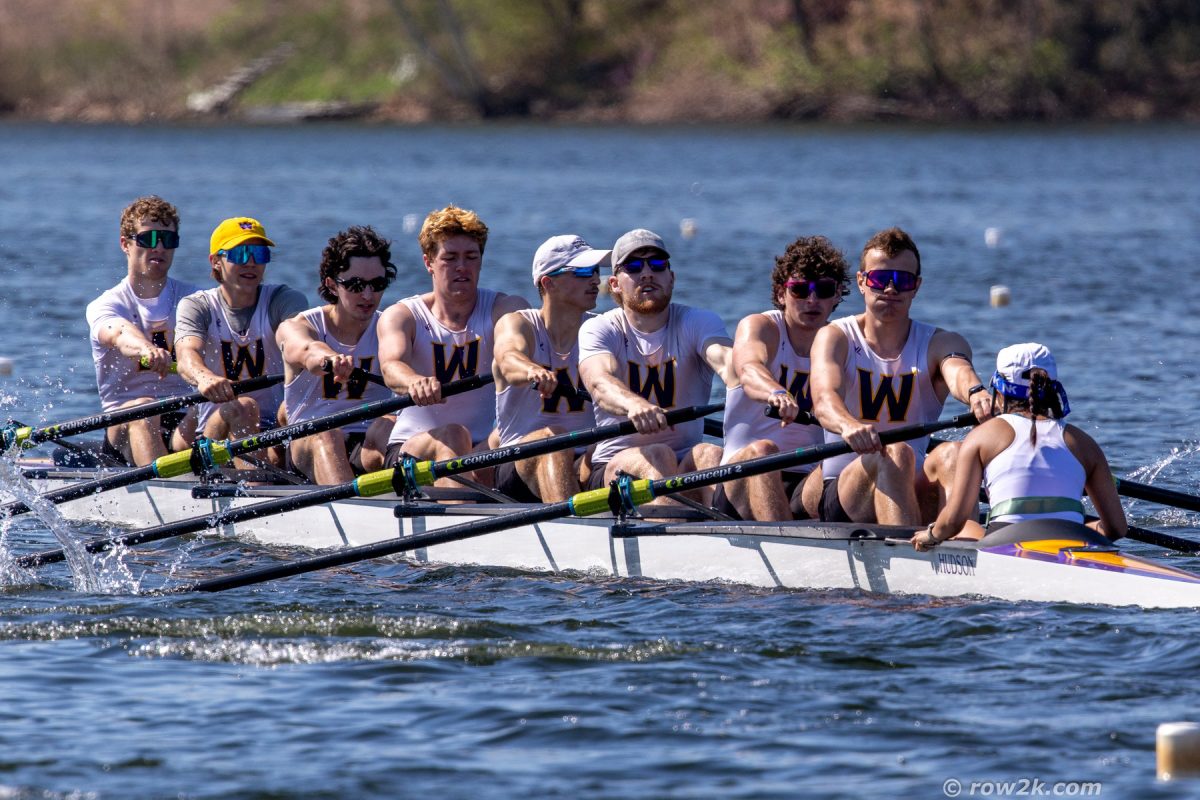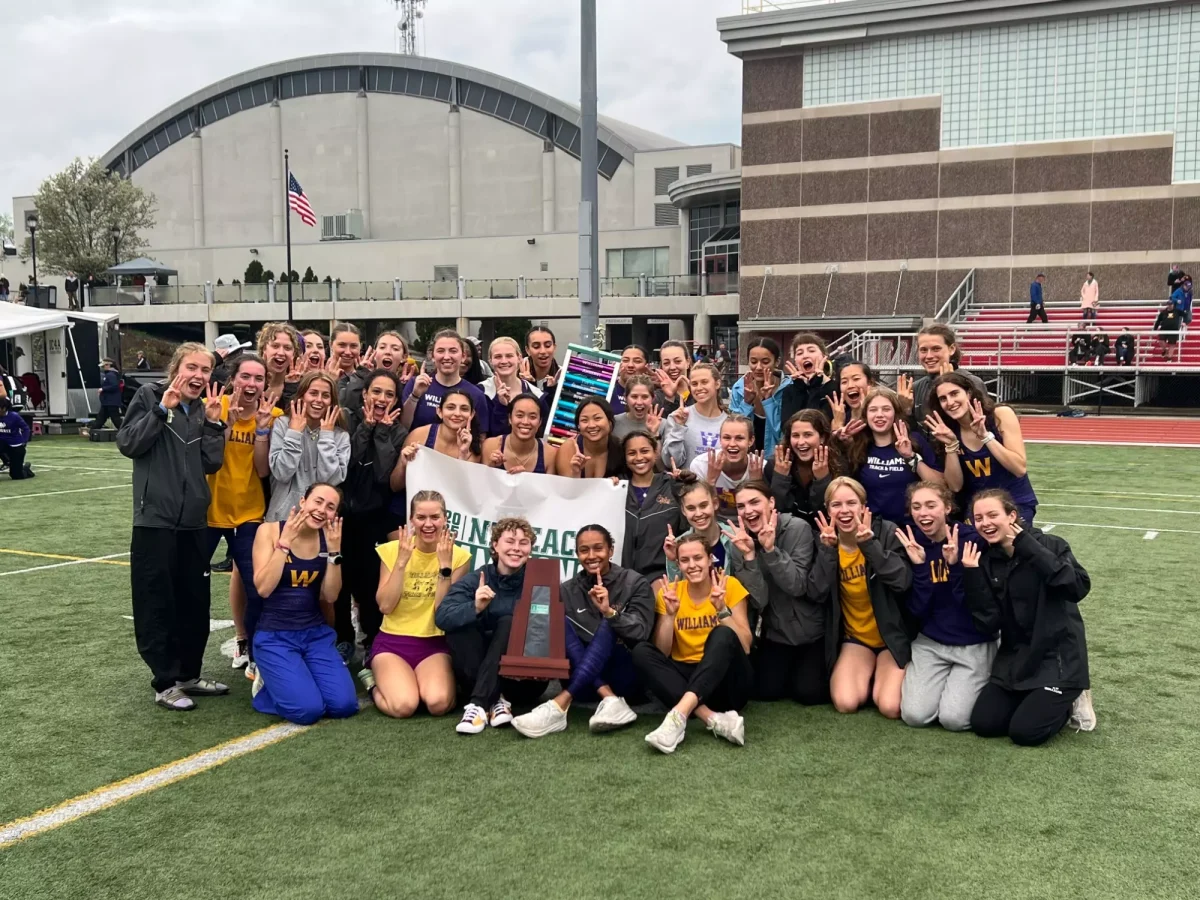
Carl Shuck ’20
Team: Men’s squash
Hometown: Rye, N.Y.
Residence: Spencer
Major: Economics & English
Snack bar order: Black bean burger
What do you enjoy most about squash?
It teaches you how to work hard. Plus, I think squash is an inherently fun game. There are a lot of valuable lessons squash has taught both me and my teammates. You really work hard and will sometimes still lose. It builds a lot of mental toughness and has become a game I will play for the rest of my life.
Squash is all Div. I, so what is it like playing schools that are so much bigger than the College?
You know, it’s tough. When you’re playing a team that’s much better, a kid that’s much better, it can be tough. Although we train pretty hard, a lot of the teams that we play have a lot more experience than us. But it’s actually a good lesson. It builds acceptance and mental toughness. There are a lot of things in life that are out of your control. You can work as hard as you can and still lose. But I think that also makes the wins more satisfying. If you could win every single match during the season, winning would lose its magic. To work really hard and lose, but then to work really hard and win makes the wins all the more special.
Your team has had a pretty successful season, considering you’re currently 8–5. What are your goals for the rest of the season, both as an individual and as a team?
My individual goal is to just stay healthy. I’ve been pretty lucky to have played all four years without an injury, but I am currently dealing with an injured hamstring. For the team, we must play to the best of our ability, but it’s tough because there are some matches you will probably lose. So we have to play our best, have fun, and win those contentious matches I was talking about. It’s also a long season, almost four months, so a lot of it is not getting burned out. Right now, when it’s a little quieter in the season before nationals and NESCACs ramp up, people need to rest. Longevity is important.
What do you view your role is as captain both on and off the court? How do you execute this?
On court, it is making sure that everybody understands that this is a sport that sees the most success when everybody takes it seriously. We have to make sure everybody shows up on time and gets their training in. People have to take care of their bodies, stretch and go to the trainer. We have to set an example.
I think, off [the] court, Williams can be a tough place, [so it’s] making sure that freshmen understand the lay of the land academically, whether it’s with their major, a class or a professor [and] making sure they know what’s going on before they are diving into it. I want to make sure they know they have somebody they can talk to, whether it’s athletically, socially or academically. Captains don’t have it figured out all the time, but we have to do what we can to help them.
I know that you’re in the Octet a cappella group. Are there any other clubs or organizations you are involved in on campus?
I help our assistant coach, Tom Hodgson, with teaching squash to the faculty’s kids. I think it’s fun. It’s fun to teach and give back in some way.
How are you able to balance all of your extracurriculars on top of your schoolwork and still remain a present leader on the team?
I think that the best way to balance things is to be really honest. People appreciate honesty, and a good way to be a leader is to not only appear strong and know what’s going on, but also be willing to let them know if you are having a tough day. People really look up to vulnerability. My best advice to anybody on campus is that honesty is a leadership quality, even if that means you can’t appear as if everything is hunky-dory before a squash match or an Octet rehearsal.
Do you guys have any unique pre-match rituals?
Like most teams, we have a huddle before the match where each captain gets to say a few words. We also do a team warm-up where we listen to music. It’s interesting though, because squash is a team sport, but it’s also very individual and everybody has their own little thing they do before a match. I meditate for about an hour before my match. Squash is a fine balance between being excited and also being relaxed because if you’re too pumped up, that nervous energy can drain you. I try and calm the body and mind down until I get on the court. Then I try to rev it up.
What will you miss most about the squash team after you graduate?
I obviously love the guys a lot, and this year we have a really hard-working, earnest group. I think that I’ll really miss the structure of it too. I think it’s something to look forward to and something to keep you active. But I’ll really miss that communal feeling, knowing that you’re part of something bigger than yourself. It’s easy to get caught up in your own individual life at Williams, and I think it’s important to be part of a group working towards something outside of yourself.

Carl Shuck ’20
Team: Men’s squash
Hometown: Rye, N.Y.
Residence: Spencer
Major: Economics & English
Snack bar order: Black bean burger
You were on the team as a first-year, but you weren’t able to play, right?
I actually had surgery freshman year, so I didn’t play freshman year. I had surgery this year, so I’m not playing this year. But I got a good two years in the middle.
So what was it like being on the team as a first-year and not being able to play?
It was definitely really hard to feel connected to some of the upperclassmen on the team. I got to know the freshmen really, really well because they’re in my class, and we spend a lot of time together. But I think it was harder to get to connect with the upperclassmen just because there’s little moments that you share on the field that, when you’re on the sidelines, you just aren’t really a part of in the same way.
What’s it like being a captain while sustaining an injury this year?
I think it definitely has its challenges. I think a lot of being a captain, at least for our team, is very logistical, like you’re really tuned in to the things that are happening on the team. From the sidelines, I can get a decent amount of it because people come off, and they say what’s on their mind. I can kind of pick up on all of that, but I think there’s definitely an element of not being able to lead on the field. The moments where it’s going really well, I don’t mind that I can’t play, I’m like, ‘Well, everything’s great and I’m just happy to be here.’ But I think the moments where I wish I could step up are moments that are really challenging, and I’m just on the sidelines cheering people on. I think it’d be awesome and helpful if I could be on the field leading by example.
Do you do anything to make up for feeling like you can’t really do much from the sidelines?
Normally, on the field, I would give directions to people playing in front of me. I play defense, so the people in front of me are mostly midfielders. So instead of doing that, because I’m on the sidelines, I’ll talk to people who are playing my position, especially underclassmen, and give them pointers about how they can do that role better and also what they can say to the people in front of them. So I’ve tried to take on a role as a mentor to the first-years just so they can understand how our system works and how the defense works together.
Speaking of fields, what’s the weirdest thing you’ve seen on a soccer field?
A couple of weeks ago, there was a snapping turtle on the field. We were walking back, and I saw a bunch of people huddled and one person standing. I thought she was yelling at them, but then I got closer and realized that they were all huddled around a turtle on the field. We get a lot of dogs on our field, which is fun. It’s not strange, but it’s fun. Our coach gets mad when everyone gets distracted, but at the end of the day, when there’s cute dogs running around, it’s hard to stay focused.
What do you think is the coolest position?
I mean, personally, defense is the best. Offense wins games, defense wins championships. [Laughs.] But I think it definitely depends. There’s definitely a personality type for each position. I think defense are people that really like the physical aspect of soccer, and the forwards are really technical players. [They’re] the ones who are composed and good at goal scoring. Not to say that defense can’t do that, but I think that each position comes with a different skill set and it’s almost like a different personality, which is kind of funny. It all somehow works together.
What do you think about goalies, then?
Everyone always jokes about how goalies are a breed of their own. My brother and dad both play goalie, and I joke about that with them all the time. You have to have an incredible amount of focus to be a goalie because you have to stay checked in the whole time, even if the ball is not anywhere near you. You also have to be kind of crazy for wanting to have people kick as hard as they can at you. I think all the goalies are a little quirky, but nothing too bad. We still like them.
What are team traditions?
We’re really big into singing and dancing, even though we’re all terrible at it. Before games, we have a bunch of dances that we do in the locker room or songs that we sing, which I think is part of the fun and what gets people really hyped up for the games. When we have home games, we do a dance literally on the field before the game, which I’m sure is really annoying to the other team. But it’s a really nice way to have fun and kind of forget about whatever stressful moment might become of that game.
Is there a team go-to song?
We have like four or five songs that we play on pretty heavy rotation before every game, like the song “Everytime We Touch” by Cascada. We have our own words to that, and I think that’s probably one of my favorites that we do.
What will you miss most about playing soccer at the College?
I think mostly the team. I think it’s really great to have a place where you can go down to hang out with people who are all focused on the same goal and you have to push and demand a lot of each other. [I’ll] also [miss] being able to have fun and play and not really having to focus on school. Everything else goes away when you go down to the field. Even if I play soccer recreationally, I don’t think the same thing will happen after college. Having the team is something that I’ll really miss and having our own little space on campus, which is really awesome.

Alison Robey ’20
Team: Men’s Crew
Hometown: Kent, Conn.
Residence: Currier Hall
Major: Environmental Studies and Math
Snack bar order: Nachos with chicken and pesto
How did you get into coxing?
My brother was a rower at the same school and I’m a big fan of him. So I wanted to be a rower, but I was like 80 pounds and four feet tall so they suggested that I try coxing and I liked that a lot and I never really got that much bigger so I just stuck with that.
Why did you join the men’s team?
I switched over originally [in high school] just because of the number of coxswains that were on each team and I had some closer friends on the guys’ team. The way that [my] high school team worked, I definitely liked the coaching better on the men’s side. It just worked better with me. The dynamic between me and the rowers on the men’s side is just a little different than on the women’s team, and I personally liked it better that way. It’s definitely different for different people.
What is something about coxing that most people don’t know about?
I mean the easiest one is that most people think that coxswains just steer, or just steer and say “row” on repeat, but we do all the strategy in the boat. Most of the time, [for] experienced coxswains, the coach will tell us what they want practice to look like and we’ll run it while they run next to us and give advice and such. We have a more involved role than some people think, so it’s definitely a very multi-faceted role.
How do you train as a coxswain?
We’re allowed to do some of the physical training if we want to, but it’s not a necessity of the sport for us. There’s not a lot of coxswain training available. That’s kind of a thing in the sport right now. We definitely have trouble training some coxswains when they’re coming in fresh. It’s hard to teach new coxswains all the skills all at once, especially when you have experienced rowers in the boat, who sort of know what you’re supposed to be doing. In high school, my training was a lot of listening to other coxswains [and] listening to recordings. They would have us ride in the launch sometimes to follow the other coxswains around and get feedback from the rowers [about] what works for them and what’s annoying.
What’s the hardest thing about coxing?
Multitasking. It’s a lot of multitasking. I think it’s very easy to get sucked up into the talking part of it, because that’s what people notice the most, but the steering is the most important part. It’s not an easy thing to do and it takes a long time to learn. Being able to balance those appropriately when you’re in the boat is definitely the tricky part.
Have your skills in coxing been applicable in other parts of your life?
A lot of the leadership stuff has definitely been big for me. I was very, very shy when I started coxing and I definitely had to grow out of that a little bit, because if you don’t do this stuff with confidence, it doesn’t help anyone. So it’s definitely been a big learning curve in terms of being confident about decision making, being confident about leadership and things like that.
What has your experience been as a female captain of a men’s team?
Honestly, less weird than people always expect. This is now my sixth year on a men’s team, so it doesn’t really feel that out of character [since] I was already doing the thing where I told them what to do. So it’s for sure more of that, and it’s definitely a little different working with co-captains who are both guys, but I think it’s been good on the whole. We have a completely democratic captain-choosing processes so it was something the team wanted, which is really cool for me. I think it hasn’t been that different from a general captain experience, it’s just been a lot of building off the same stuff of what a coxswain does.
What’s the weirdest thing you’ve seen on a boat?
We’ve got this as kind of a running thing in crew. A lot of times, we’re on the water 40 minutes before a race happens and guys usually have to pee right before a race happens. I don’t usually see that, but I’ve witnessed men peeing in a lot of different items in boats.
Wait, so they don’t pee off the boat?
They pee off [the boat] if they’re allowed to. But there are some rules where you can’t do that, because they don’t want guys just peeing off boats everywhere. It’s legitimate. So, they pee in a water bottle or something. The worst I’ve seen is a Sun Chips bag. That was in high school. [I’m] still not sure how that happened or how that worked. That was my first race in a men’s boat, actually. One of the guys had brought Sun Chips out to snack on, which was weird in the first place, and then we were getting to the line and a guy was like, “Can I use your Sun Chips bag?”
What’s the weirdest thing you’ve had to do as a coxswain?
One of the traditions of coxing is that if we win a race, [the rowers] get to throw you into the river, which is fun. We only do it for championships in college, so it hasn’t happened recently, but it happened to me a lot in high school.
Are there other team traditions?
There’s a lot of crew lore that we follow. Like all the boats have this bow ball on it, and you’re not supposed to wash that when you’re cleaning the boat for good luck. That’s a full team sport thing. And then in collegiate rowing, at the end of a race, you give all your shirts to the person who wins, so you always have a bunch of betting shirts floating around.
What are your goals for your last year on the team?
We’ve had our current coach for three years now, and before that I ran through, I think, five coaches my freshman year here, which was a lot of complicated stuff. But the team definitely was kind of in a rough patch when I came in because we were having a hard time recruiting people and, with that kind of mix-up, we were losing a lot of people from year to year. [But] we’re finally getting to the point where we have classes [which] pretty much no one leaves from year to year that are really committed to doing well in the sport. We [also] have good freshmen coming in, so this is our fastest year in a while, I think. The [Head of the Charles] race records have definitely shown that. We’re definitely hoping to pick up on that as the spring comes. We had kind of an on-and-off season last year, where we did better than we had previously but we definitely could have been more consistent with it. I think we have the strength to go through with that now, so that’s definitely a hope going forward.
What will you miss most about being on the crew team here?
I’ll just miss being on a team in general. We have a really big team, so you get a lot of friends and people you know around campus on it. I think we’ve had a team culture that’s just been getting better and better while I’ve been here, so I’m excited to see how that keeps growing when I leave. I’m definitely gonna miss being a part of it.

Daiana Takashima ’20
Team: Volleyball
Hometown: Walnut Creek, Calif.
Major: Psychology
Residence: Horn Hall
Snack bar order: Nachos with barbecue sauce, chicken and mozzarella
How did you start playing volleyball?
My older sister started playing in sixth grade, so I was in third grade, and being the younger sister, I copied everything she did. She needed someone to practice with, so I just started playing. We went to a nearby club and they had an adult league there, but they would see us hovering on the side so they let us in and helped us. That’s how it kind of started. It’s kind of funny because my mom hates team sports. She golfed in college and made me try golf, but I was like, “Nope, volleyball it is.”
Do you have any volleyball team traditions?
We do this thing called “buddies,” where an upperclassman is paired with an underclassman each year. On one of the last days of preseason, we have a big reveal. In our locker room, Coach [Christi Kelsey] makes a whole yarn maze from one [buddy’s] locker to another. When you walk in, it’s a whole web of yarn and you have to find your buddy. Then, on game days, we give notes and little gifts to each other. It’s a nice pick-me-up. Having a focus on each other is really nice.
Is there something that only your teammates know about you, or a side of you that only they see?
I’m a really deep sleeper. My team and my entry would know this. I’m really hard to wake up – literally you have to pick up my head and shake it. People always joke around and pick up my arm and drop it because I won’t wake up. For the first away game, you room with your buddy and this year, we told the freshmen. But in previous years, we haven’t told the freshmen and they [would] have the hardest time waking me up. They’ll be frantically texting the group chat, “Daiana won’t wake up! What do I do?”
Do you and the team have any pre-game rituals?
We have a dance party. [Laughs.] We go in the locker room, play music and just have a big dance party. Hopefully not too big, though, because we still have to go and play a game and shouldn’t be too tired.
What’s the go-to song?
“Kill the Lights” [by Alex Newell] is a good one. It starts off kind of slow, but there’s a big chorus beat drop.
If you had to rename volleyball, what would you name it?
I think it’s like a really intense version of Hot Potato and Don’t Let it Touch the Ground. When I have coached and have had to explain it to little kids, that’s how I explain it. I think I would name it that.
Is there anyone who always comes to volleyball games?
So, we have faculty liaisons, Professor Alan [White] in the philosophy department and his wife, Jane, who used to work in alumni relations and is now retired. They come to every game. They’ve even driven up to Bowdoin in Maine just to watch us. The whole psychology department is filled with really big fans of volleyball too, especially Professors Sandstrom, Fein and Kornell. They all play, so we’ve had “the psych department versus volleyball” day.
You are also the secretary of the Student Athlete Advisory Committee (SAAC). How has that been?
I went to check it out my freshman year and really understood the mission but, as a general board member, I felt like I was part of something but not actually really doing anything fully. So then, I joined the executive board my junior year. It’s really about focusing on making the student-athlete experience better and making it a more inclusive environment. We’ve been working really hard to have panels on Claiming Williams Day about the athlete/non-athlete divide and working with higher-ups [at the College] to make it more inclusive and less divisive right at the start [during the Ephventure TeamEph]. We’ve also worked on Training Wise at Driscoll. Oh, and the pasta bowls at ’82 at night.
I didn’t know that SAAC started the pasta bowls. How did you do that?
It was during my sophomore year, I think. During offseason, we have late-night practices that cause us to miss dinner. Everyone wanted food that is more filling [than snack bar], so SAAC was like, “Why don’t we get pasta bowls?”

Sam Goldenring ’20
Team: Men’s golf
Hometown: Florham Park, N.J.
Major: Economics
Residence: Above Tony’s Sombrero
Snack bar order: Egg McWilliams with sausage
How did you get into playing golf?
I started when I was 7, because I have an older brother who also played golf here [and] graduated in 2015, and my dad started playing after college. My brother wanted to tag along one day with [my dad], so he took him to some pitch and putt course right by our house. Me being the younger brother, I wanted to go along next time, and then I somehow realized that I’m actually pretty good at this. The rest is history.
Is there a lot of competition between you and your brother?
Oh yeah, it’s very intense. He’s in medical school now, but he’s still a very good player. We had some very fun and heated matches at home over the summer, but that’s what makes it fun. That’s why golf is so great.
What is the weirdest and/or funniest thing you have ever seen on a golf course?
In Little Threes my sophomore year, there was a kid from Wesleyan who let out pretty much a vulgar scream after making a 40-foot putt for an eight, which sounds pretty wild. Then also on the same hole, he hit a shot into a housing development and just waved it off like it was nothing.
How do you train for golf?
In golf, you can pretty much do as much or as little as you want. I’m still considering playing professionally after I graduate, so I model what I do after the guys on tour. I’m in the gym a lot, more than most people think a golfer needs to be. There is a lot of flexibility and core strength, stuff that you need to be able to produce a fast swing over and over again without throwing out your back. To be honest, it’s all kind of injury prevention stuff. So if my body is in a good spot, I can go as hard as I want at my swings.
What are your thoughts on mini golf?
Oh, I love it. I love mini golf. People always tell me, “Oh if we play mini golf, would you beat me by 20?” and I’m like, “In all honesty, I don’t know.” I do stupid stuff, like I’ll putt lefty if I’m playing with my friends. I love it, especially as a way to get people into golf — I can’t think of a better thing.
Have non-golfers ever beaten you in a game of mini golf before?
Especially in the past few years, no one’s ever really come close. But it’s always fun bringing someone so new to the game to play mini golf and they just have a ball.
Is Wii golf a good approximation for actual golf?
Terrible. That is probably the one golf video game I am horrendous at. I can’t figure it out. I’ve tried to swing easy; I’ve tried to just rip at it. That’s probably the one game that a lot of people can beat me at.
What is your best or favorite golf outfit?
I’m not known on my team to have a super preppy wardrobe. But I’ll just say it — I have these pair of pink pants which I think are pretty electric. I’ll wear the pink shorts with a tame belt and this gray and white striped shirt. That’s kind of the usual go-to for me. There’s this phrase in golf, “look good, feel good, play good,” and I just kind of go off of that. And you know how golf gets such a bad rep [from] the 60 year-old retired guys with beer bellies wearing khakis that don’t fit. So I just kind of like to have fun with it.
What was your experience like being a captain as a sophomore?
It was weird. It was very weird. Even though I was in a position of power and leadership, I didn’t feel like the team was mine. Even as a sophomore, as a captain, you’re supposed to be the guy who has got your stuff figured out. But I had a pretty hard time adjusting freshman year, so I still didn’t really get things. Being one of the guys that people look up to, there is some pressure there.
Is there any advice you would have liked to tell yourself two years ago?
It’s OK to not know things. Being in that position [of captain], I felt obligated to find this out for people or do all the things that people were asking of me. But in reality, I was just a sophomore who didn’t really know what was going on. It’s OK to not know things and it’s OK to ask for help and reach out.
What is something about golf that most people don’t know about?
I’d say it’s pretty peaceful, especially at Taconic. It’s probably my favorite place on campus just because it’s so beautiful. If I have a lot going on off the course in my life, I know that the golf course is a place I can go to just relax and take in the scenery and not really care about anything else. Golf is kind of my escape in that way, and it can be that way for a lot of people.
So what will you miss about playing at Williams?
I haven’t really even thought about it yet, but probably just that whole family atmosphere I was talking about. It’s just super cool to be putting with my headphones in and then have someone come up and tap me on the shoulder and be like, “Hey, you don’t know me, and I don’t know you, but that was really awesome what you did.” I’ll definitely miss that and just the whole team. Team golf is so different from the golf I play over the summer where it’s just me, myself and I, but having four other guys to travel with, four other guys that will always have your back if you have a bad day, that’s just something that you can’t really find outside the college arena.




